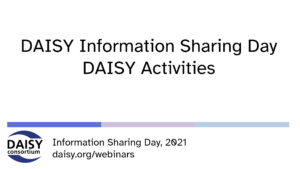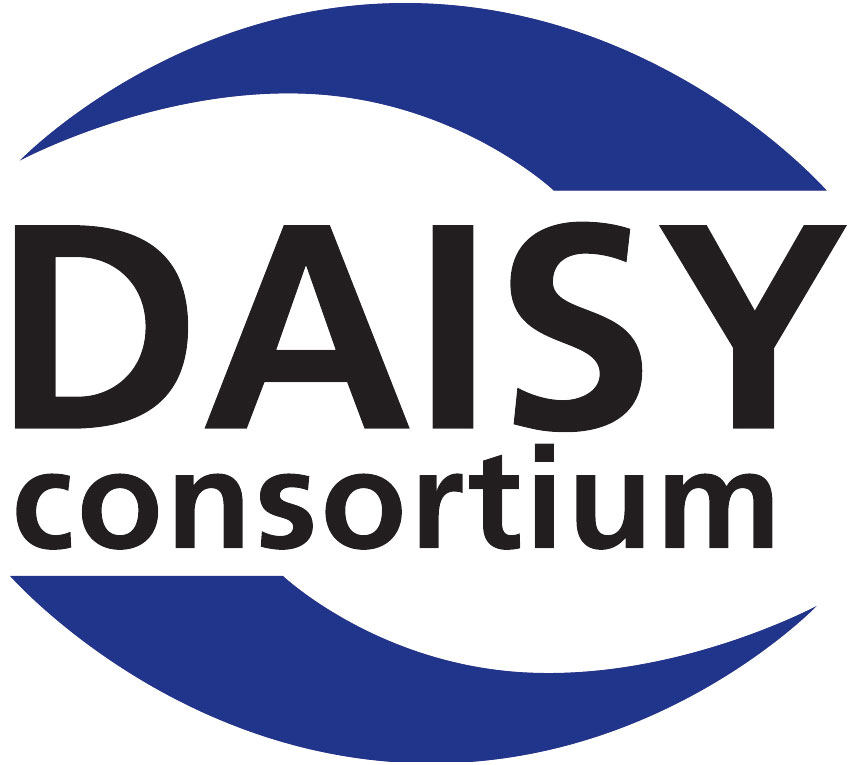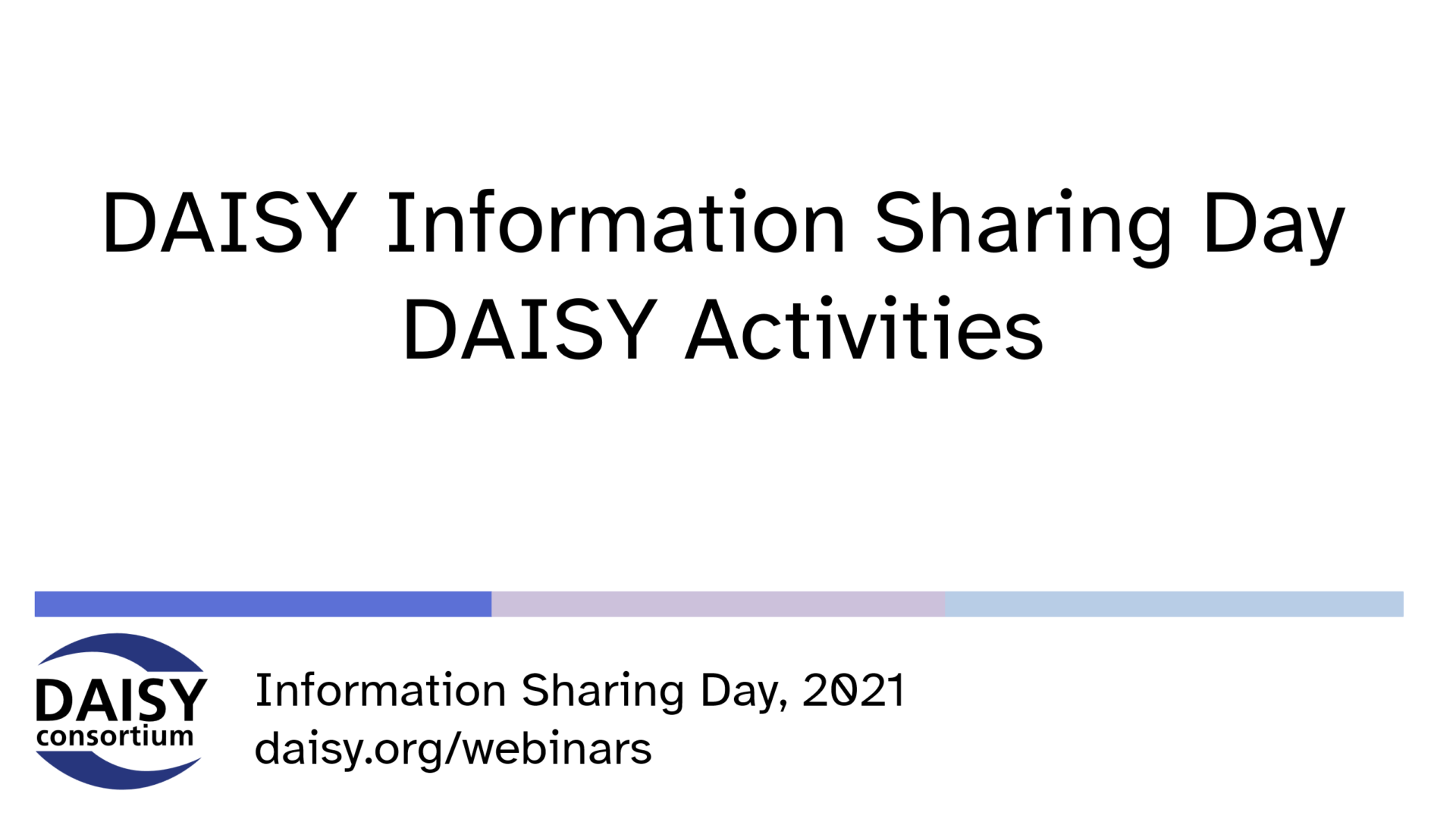DAISY Activities – 2021 DAISY Information Sharing Day (W)
 Towards the end of 2021 we held a special DAISY Information Sharing Day webinar. This part of the webinar highlights some of the activities DAISY is engaged with. This overview below will direct you to individual videos detailing these projects and work.
Towards the end of 2021 we held a special DAISY Information Sharing Day webinar. This part of the webinar highlights some of the activities DAISY is engaged with. This overview below will direct you to individual videos detailing these projects and work.
This page contains:
Speaker Information
- Richard Orme, DAISY Consortium
- Maarten Verboom, President of the DAISY Consortium
- Avneesh Singh, DAISY Consortium
- Jostein Austvik Jacobsen, NLB
- Marisa DeMeglio, DAISY Consortium
- Dipendra Manocha, DAISY Consortium
- Thomas Kahlisch, Chair of the European Inclusive Publishing Forum
- Sarah Morley Wilkins, DAISY Consortium
Session Overview
Welcome video transcript
Maarten Verboom opened the session by welcoming the large audience and explaining that this first hour looks at the activities currently being undertaken by The DAISY Consortium via 6 presentations.
DAISY Project Highlights
DAISY Project Highlights transcript
Avneesh Singh gave us an overview of some of the core activities undertaken by The DAISY Consortium.
- Standards work where DAISY drives the inclusion of accessibility within mainstream publishing standards. Recent updates in this area include: EPUB Accessibility 1.1 which is approaching Candidate Recommendation stage, the launch of the User Experience Guide for Displaying Accessibility Metadata (more about this in the Publisher Information session) and continuing contributions to WCAG 3.0.
- DAISY Pipeline Case Study which is the backbone of many of the workflows of DAISY Members. Recent work includes the development of a new MS Word plug-in.
- DAISY Tools: WordToEPUB version 1.0.7, Obi version 4.7 and the continued maintenance of Tobi
- Transition to EPUB 3 and the work of the production processes group and the reading systems testing group (more about this in the Publisher Information session).
- Accessibility Baseline Project for establishing and driving inclusive publishing worldwide, originally a Google Impact funded project and still driving work on tools such as Ace by DAISY and Ace SMART alongside the Inclusive Publishing website.
DAISY Pipeline Case Study
DAISY Pipeline Case Study transcript
Jostein Ausvik Jacobsen gave us an overview of the production workflow at NLB and how files progress from source files, through pre-production, conversion, post-production and, finally, distribution. Workflows for braille, TTS narration, human narration (including a hybrid version) and ebooks were outlined. Jostein explained which Pipeline versions are used and why for each specific workflow.
Accessible Books on the Web
Accessible Books on the Web transcript
Marisa DeMeglio, DAISY software developer, described this project which aims to create a completely accessible reading experience within the web browser, leveraging native web technologies: the creation of browser-ready content which offers text and text + audio accessible reading experiences. This includes offering full navigation, playback of synchronized audio and the ability to make visual adjustments. A traditional DAISY book requires specialized software to open and read the content. By building the controls into the book itself, we can use the browser as the platform with the reassurance that web accessibility practices are already in place. Watch the video above for demos of all the features!
Capacity Building During Covid Times
Capacity Building During Covid Times transcript
Dipendra Manocha explained some of the challenges that The DAISY Consortium has had to overcome during the pandemic: onsite training could not continue, the ABC capacity building projects were put on hold and workshops, orientation sessions and awareness based work were postponed. The development of a bespoke LMS allowed DAISY to deliver a huge variety of content and training modules, enabling ABC to deliver on training commitments as part of their capacity building projects in 14 countries. The advantages for trainees of being able to learn at their own pace are huge, allowing them access to quality instructional materials for an extended period of time.
Preparing for the Revolution in Born Accessible Publishing in Europe
Preparing for the Revolution transcript
Thomas Kahlisch introduced the work of the European Inclusive Publishing Forum, set up to concentrate on the new landmark legislation The European Accessibility Act. The legislation dictates a minimum set of requirements for the production of accessible goods and services, including ereaders and ebooks. The forum has established a mechanism for stakeholders to work collaboratively both in Europe and internationally.
Information and resources surrounding the EAA and the work of this project group are available at inclusivepublishing.org/eu which Thomas presented in his session. A baseline survey and resulting case studies have been particularly welcomed.
Improving Access to Music Braille
DAISY Music Braille transcript
Dr Sarah Morley Wilkins is leading this project which focuses on securing the future of music braille production in the face of declining expertise, a lack of suitable conversion tools and file format standards. Activities include the development of a professional conversion tool for transcribers, an interactive end-user tool, influencing file format standards and inclusive publishing practices together with the maintenance of an international stakeholder group.
Sarah shared with us information on the development of 2 important tools: Firstly, MakeBraille (dzb lesen), the online professional automatic conversion tool for transcribers which takes well marked up scanned music files and well structured music XML files and converts them into music braille. With prioritized feature request from the project’s stakeholder group, this tool will be available via a license agreement in 2022.
Secondly SMB-MuseScore, a free interactive tool for end-users that offers a fully interactive, multi-media music notation editing tool for creating, reading and exploring music independently in speech, sound and braille.
Other project activities include: work on music file standards, work on a music braille network, exploring the possibility of inclusive music publishing for the creation of born accessible music scores, access to online collections and the promotion of teaching and learning resources.
Related Resources
Member Activities at the Information Sharing Day
Accessible Publishing at the Information Sharing Day

